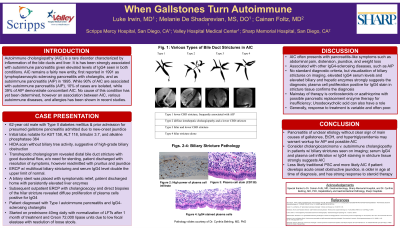Monday Poster Session
Category: Biliary/Pancreas
P1874 - When Gallstones Turn Autoimmune
Monday, October 28, 2024
10:30 AM - 4:00 PM ET
Location: Exhibit Hall E

Has Audio
- LI
Luke Irwin, MD
Scripps Mercy Hospital
San Diego, CA
Presenting Author(s)
Luke Irwin, MD1, Melanie De Shadarevian, DO, MS1, Cainan Foltz, MD2
1Scripps Mercy Hospital, San Diego, CA; 2Sharp Healthcare, San Diego, CA
Introduction: Autoimmune cholangiopathy (AIC) is a rare disorder characterized by inflammation of the bile ducts and liver. Symptoms include abdominal pain, distension, jaundice, and weight loss, which can be seen in various gastrointestinal conditions, which often leads to the under-diagnosis of AIC.
Case Description/Methods: A 62-year old male with a history of Type II Diabetes Mellitus and previous hospitalization for gallstone pancreatitis presents with new-onset jaundice and pruritus. Initial labwork was notable for mildly elevated liver enzymes, alkaline phosphatase, and bilirubin. HIDA scan performed did not reveal biliary tree activity, suggestive of high-grade biliary obstruction. Endoscopic Retrograde Cholangiopancreatography (ERCP) revealed multifocal biliary stricturing with a serum IgG4 found to be double the upper limit of normal. A plastic biliary stent was placed, and the patient was discharged home with resolution of symptoms, however with remaining elevated liver function tests. Subsequent ERCP in the outpatient setting performed with cholangioscopy and direct biopsies of the hilar stricture revealed substantially elevated plasma cells and staining for IgG4. The patient was diagnosed with Type I autoimmune pancreatitis with IgG4-sclerosing cholangitis. He was started on prednisone 40mg daily with normalization of liver function tests within 4 weeks of steroid initiation. Patient fecal elastase was found to be low, indicative of pancreatic exocrine insufficiency, for which he was started on Creon 72,000 lipase units with meals.
Discussion: AIC is a condition that often presents with pancreatitis-like symptoms such as abdominal pain, distension, jaundice, and weight loss. While cholangiocarcinoma remains the main differential diagnosis, biopsy of the biliary duct with evidence of plasma cell abundance with positive IgG4 staining strongly suggests the diagnosis. Mainstay of therapy is corticosteroids with possible pancreatic enzyme replacement therapy for insufficiency. B-cell therapy such as Rituximab is currently being studied as an alternative treatment. While AIC is associated with autoimmune pancreatitis (AIP) in 90% of cases, 10% of cases are isolated, while up to 39% of AIP cases have demonstrated concomitant AIC. While no cause has yet been determined, an association between AIC, various autoimmune diseases, and allergies has been shown in recent studies.
Disclosures:
Luke Irwin, MD1, Melanie De Shadarevian, DO, MS1, Cainan Foltz, MD2. P1874 - When Gallstones Turn Autoimmune, ACG 2024 Annual Scientific Meeting Abstracts. Philadelphia, PA: American College of Gastroenterology.
1Scripps Mercy Hospital, San Diego, CA; 2Sharp Healthcare, San Diego, CA
Introduction: Autoimmune cholangiopathy (AIC) is a rare disorder characterized by inflammation of the bile ducts and liver. Symptoms include abdominal pain, distension, jaundice, and weight loss, which can be seen in various gastrointestinal conditions, which often leads to the under-diagnosis of AIC.
Case Description/Methods: A 62-year old male with a history of Type II Diabetes Mellitus and previous hospitalization for gallstone pancreatitis presents with new-onset jaundice and pruritus. Initial labwork was notable for mildly elevated liver enzymes, alkaline phosphatase, and bilirubin. HIDA scan performed did not reveal biliary tree activity, suggestive of high-grade biliary obstruction. Endoscopic Retrograde Cholangiopancreatography (ERCP) revealed multifocal biliary stricturing with a serum IgG4 found to be double the upper limit of normal. A plastic biliary stent was placed, and the patient was discharged home with resolution of symptoms, however with remaining elevated liver function tests. Subsequent ERCP in the outpatient setting performed with cholangioscopy and direct biopsies of the hilar stricture revealed substantially elevated plasma cells and staining for IgG4. The patient was diagnosed with Type I autoimmune pancreatitis with IgG4-sclerosing cholangitis. He was started on prednisone 40mg daily with normalization of liver function tests within 4 weeks of steroid initiation. Patient fecal elastase was found to be low, indicative of pancreatic exocrine insufficiency, for which he was started on Creon 72,000 lipase units with meals.
Discussion: AIC is a condition that often presents with pancreatitis-like symptoms such as abdominal pain, distension, jaundice, and weight loss. While cholangiocarcinoma remains the main differential diagnosis, biopsy of the biliary duct with evidence of plasma cell abundance with positive IgG4 staining strongly suggests the diagnosis. Mainstay of therapy is corticosteroids with possible pancreatic enzyme replacement therapy for insufficiency. B-cell therapy such as Rituximab is currently being studied as an alternative treatment. While AIC is associated with autoimmune pancreatitis (AIP) in 90% of cases, 10% of cases are isolated, while up to 39% of AIP cases have demonstrated concomitant AIC. While no cause has yet been determined, an association between AIC, various autoimmune diseases, and allergies has been shown in recent studies.
Disclosures:
Luke Irwin indicated no relevant financial relationships.
Melanie De Shadarevian indicated no relevant financial relationships.
Cainan Foltz indicated no relevant financial relationships.
Luke Irwin, MD1, Melanie De Shadarevian, DO, MS1, Cainan Foltz, MD2. P1874 - When Gallstones Turn Autoimmune, ACG 2024 Annual Scientific Meeting Abstracts. Philadelphia, PA: American College of Gastroenterology.
